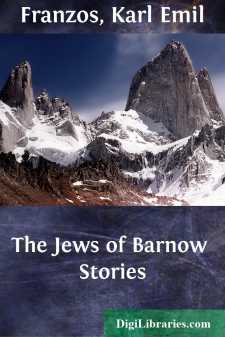Categories
- Antiques & Collectibles 13
- Architecture 36
- Art 48
- Bibles 22
- Biography & Autobiography 813
- Body, Mind & Spirit 142
- Business & Economics 28
- Children's Books 16
- Children's Fiction 13
- Computers 4
- Cooking 94
- Crafts & Hobbies 4
- Drama 346
- Education 46
- Family & Relationships 57
- Fiction 11829
- Games 19
- Gardening 17
- Health & Fitness 34
- History 1377
- House & Home 1
- Humor 147
- Juvenile Fiction 1873
- Juvenile Nonfiction 202
- Language Arts & Disciplines 88
- Law 16
- Literary Collections 686
- Literary Criticism 179
- Mathematics 13
- Medical 41
- Music 40
- Nature 179
- Non-Classifiable 1768
- Performing Arts 7
- Periodicals 1453
- Philosophy 64
- Photography 2
- Poetry 896
- Political Science 203
- Psychology 42
- Reference 154
- Religion 513
- Science 126
- Self-Help 84
- Social Science 81
- Sports & Recreation 34
- Study Aids 3
- Technology & Engineering 59
- Transportation 23
- Travel 463
- True Crime 29
The Jews of Barnow Stories
Description:
Excerpt
TO THE AMERICAN EDITION.
Although the high literary art which Franzos possesses (the finer quality of which has been preserved in this translation) is fully admitted by intelligent Jews, the subject-matter of his book itself, its raison d'etre, they have by no means relished. In a review of "The Jews of Barnow," published some months ago in a leading New York journal, it was asserted by the writer that, from internal evidence, Franzos must be a Jew. This statement was directly controverted by a Jewish weekly of the highest standing. Still, we must believe that the acumen of the New York reviewer was not at fault, because in a late number of "Blackwood's Magazine," which contained an interesting criticism of Franzos and his book, it was asserted that the author is or was a Jew. No man not born a Jew, perfectly familiar with all the phases of Jewish life in Eastern Galicia, and in sympathy with them, could have created this book. Franzos may have clothed Jews and Jewesses with poetical raiment, given them melodramatic phrasings, but the gabardine, caftan, love-locks, are visibleâthe whine, the nasal twang audible.
This denial that Franzos was a Jew, though apparently insignificant in itself, and due, perhaps, to a want of acquaintance with the facts, is still peculiarly indicative of a natural travers of the Jewish mind. Any description of the inner life of Jews, when written by a Jew, unless it be laudatory, is particularly distasteful to Jews. No race cares to have its failings exposed. From one of another creed such strictures may be passed over with stolid indifference, but, from one of their own blood, any censure, direct or applied, is considered by Jews in the light of a sacrilege. With Jews it is ever a cry, "It is a dirty bird that fouls its own nest." Such acridity as a Goldwin Smith distills, Jews laugh at; but when one of their kinsmen, a Mr. Montefiore, finds fault with them, bidding them look for grace in another direction, then at once a holy horror pervades them.
What Franzos describes is Jewish life pent up within the narrow limits of some Galician town. Religious dislikes, racial hatreds kindled a thousand years ago, have never been quenched. Though to-day in that town a Jew could not be murdered, because it would be against the law, the inclination to kill him, because he is a Jew, still exists. The simple fact, that every Jew had been taught to read and write, had quickened his brains. Through heredity he became, intellectually, superior to the illiterate peasant, or townsfolk, who hemmed him in. The mental phenomenon the Jew would present, under such conditions, would not be, after all, so peculiar. He had but two ends in life, to work and pray. Even his toil was restricted, for he could only engage in certain callings. His solace was his religion. He might pray to his Maker, but only in such set phrases as had been chosen for him. His God was by far too sublime for him, poor worm, to address in such homely words as might well up spontaneously from his own heart....


